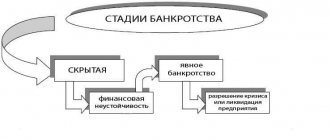Bankruptcy proceedings are the final stage of the procedure for declaring a debtor financially insolvent and it ends with the liquidation of a legal entity. It is introduced into the company on the condition that there is no chance of restoring its solvency through the stages of reorganization and external management.
At the stage of bankruptcy proceedings, the management levers are with the bankruptcy manager. This person is vested with a wide range of powers to solve the main task: maximum satisfaction of creditor claims before the final liquidation of the enterprise. His activities are aimed at the interests of creditors, so the person is elected from among independent persons.
If we are talking about bank bankruptcy, then the functions of the manager are transferred to the Deposit Insurance Agency.
Functions and tasks
The actions of the bankruptcy trustee are aimed at ensuring the integrity and safety, accumulation and sale of property owned by the debtor. Its competence includes the following functionality:
- searching for the debtor’s assets, taking effective measures to return the property to the bankruptcy estate;
- compiling a register of creditors and clarifying this list;
- inventory and assessment of the property of the debtor legal entity;
- selling it at electronic auctions at market value;
- mutual settlements with creditors in accordance with the register.
The tasks facing managers are complex and multifaceted, which determines strict requirements for the candidacy of a manager.
The manager is responsible for ensuring the financial and economic activities of the enterprise until it is finally liquidated. In the course of his work, he analyzes the economic activity of the enterprise and draws conclusions regarding the presence/absence of signs of fictitious bankruptcy.
Grounds for bankruptcy of a commercial company
Almost any commercial enterprise at certain points in its activities is faced with the presence of outstanding debt. Often, its occurrence may be related to technical issues: for example, in order for funds to arrive from the organization’s account to the account of a supplier or partner, it takes several days, during which the existing debt will be formally considered outstanding. However, almost all companies face such aspects of business, and therefore their occurrence rarely raises questions or complaints from anyone.
The situation is completely different if the reasons for the outstanding debt are of a different nature. For example, they may be associated with financial difficulties in a company whose monetary obligations currently exceed its capabilities. In this case, the problem that has arisen cannot be solved in a few days; this requires a more serious period of time.
However, even in this case, a commercial organization that has discovered a lack of funds in its accounts has the opportunity to correct the situation. For example, she can urgently take on a large order, the terms of the contract under which require an advance payment, and thereby receive the necessary funds allowing her to pay off with other partners. Taking this possibility into account, current legislation provides sufficient time for commercial companies facing financial difficulties to use emergency solutions to such a problem. In this case, it can avoid unpleasant consequences in the form of a procedure for declaring it insolvent, during which a bankruptcy trustee may be appointed or other measures may be applied.
In particular, Article 3 of Federal Law No. 127-FZ of October 26, 2002 “On Insolvency (Bankruptcy)” establishes that the duration of such a period is 3 months from the moment when the company was supposed to repay the existing debt to a partner, supplier or other counterparty in accordance with the terms of the agreement with him. After this period, the creditor, who has not received the funds due to him, has the right to apply to the arbitration court with a statement of claim to declare the defaulting organization bankrupt. Experts recommend attaching to such an application all available documents that, firstly, will confirm the existence of a debt to the creditor, and secondly, will testify to the fact that the period allowed by current legislation for its repayment has already expired.
Appointment of a bankruptcy trustee
The appointment of a manager in bankruptcy proceedings is made by court decision. Both the debtors themselves and their creditors can file for bankruptcy. Simultaneously with the statement of claim, they need to indicate the desired candidacy of the arbitration manager or the preferred SRO from which he will be selected. According to the new law, all managers must be members of a self-regulatory organization that monitors the professional competence of its members and the quality of their performance of their duties.
Usually in bankruptcy cases the second option is practiced, when there is no direct indication of the person of the specialist. In this case, the SRO sends the court a list of currently available candidates who meet the presented requirements, from which the judge selects a specialist.
Specialists appointed to such a responsible position must have higher education and work experience; have no criminal record or disciplinary sanctions related to their professional activities; undergo an internship as an assistant manager; pass a theoretical exam; conclude a liability insurance contract. In some cases, access to state secrets or highly specialized education may also be required.
If they disagree with the appointed candidate (for example, if he has a personal interest in the process), creditors have the right to file a petition to replace the specialist.
Removal from office
The temporary manager may be removed. To do this, his guilt must be proven using irrefutable evidence that the court will accept. This evidence is:
- creditors did not meet/the meeting was late;
- Finnish the analysis was carried out with a violation (intentional/unconscious);
- the debtor's property was not preserved due to the temporary manager;
- the specialist did not include creditors;
- negligently carried out inventory;
- falsification of information in reports;
- unprofessional plan for working with the company.
They can be removed if the manager meets the following criteria:
- have a criminal record;
- associated with the debtor company;
- interested in the affairs of the debtor or creditor.
Also, the manager will be removed if the case is terminated earlier. But this will not affect his career.
Responsibilities
The bankruptcy law assigns a wide range of responsibilities to the bankruptcy trustee, including:
- publication of information about the beginning of bankruptcy proceedings in the media;
- removal of current management from leadership;
- acceptance of accounting and other documentation, its stamps and seals;
- conducting an inventory of property;
- analysis of the company's financial condition;
- collection of receivables (forced and voluntary);
- notice of upcoming dismissal;
- filing objections to creditor claims;
- refusal to fulfill unfavorable contracts;
- taking measures to return the debtor's property;
- recognition of the invalidity of property alienation transactions in recent years;
- notification to the owner about the withdrawal of property from circulation;
- involvement of an independent appraiser;
- provide, upon request of creditors, reports on the use of funds;
- organize the sale of property at auction and its transfer to the winner;
- schedule repeat auctions (if necessary);
- establish the amount of creditors' claims;
- accounting of claims to creditors for losses caused and accrued financial sanctions;
- providing the court with all information about the progress of bankruptcy proceedings;
- after completing the calculations, enter information about the repayment of claims;
- notification of authorized bodies about the debtor’s unsold property;
- transfer of legal entity documents to the archive for storage;
- sending information to the Federal Tax Service about the completion of bankruptcy proceedings and the beginning of the liquidation procedure;
- submission to arbitration of information on approval of the settlement agreement.
Competition manager's report
After settlements with all creditors are completed or bankruptcy proceedings are terminated for the reasons specified in Article 57 of the Federal Law, the CC must provide a report on the work done and the results of this procedure to the arbitration court.
This is also important to know:
Current payments in case of bankruptcy of individuals: which ones are current, the order of their repayment
The bankruptcy trustee's report is a list of documents confirming:
- sale of the debtor's property;
- repayment of loan obligations;
- provision to the Pension Fund (its territorial division) of information about the date, place of birth of the debtor, his citizenship and passport data, including the full name, gender and permanent registration address of the bankrupt person, as well as information that must be recorded in this body in accordance with paragraph two of Article 11 -th Federal Law “On individual registration in the compulsory pension insurance system” (insurance number of an individual personal account, information about places and periods of work, etc.).
In addition to the above documents, the bankruptcy trustees must attach to the report a register of creditors' claims, which will indicate the amount of paid debts of the bankrupt person.
After the CU has compiled and submitted its report to the competent authority, it is obliged to notify creditors of this fact.
Rights of the bankruptcy trustee in bankruptcy
The temporary head of the bankruptcy proceedings stage has the right to freely dispose of the debtor’s property, as well as to engage in personnel changes: dismiss management and take measures to optimize the staff.
The bankruptcy trustee may refuse to carry out certain transactions that could ultimately negatively affect the value of the company's assets.
If, during the analysis of economic activities, it becomes known about illegal operations to transfer the assets of a legal entity to offshore sites in order to avoid their inclusion in the bankruptcy estate, then he can appeal these operations in court.
The manager can also impose requirements on entities whose duties include subsidiary liability.
Responsibility
The legislation provides for the following types of liability for bankruptcy trustees:
1. Removing him from work. This decision can only be made by the court based on a petition from creditors.
2. Exclusion from SRO. The manager may completely lose the opportunity to engage in such activities in the future due to improper performance of his duties and violation of the set of professional rules of the SRO.
3. Compensation for losses. If creditors can prove that as a result of the manager’s activities or his inaction, they suffered material damage, then the manager will have to compensate for it from his personal funds. The grounds for compensation for losses may include failure to use all opportunities to collect receivables or return property, challenge unprofitable transactions, etc.
4. Application of other types of liability. Administrative and criminal liability measures may be applied to the manager for offenses committed by him as a manager.
As a standard, a determination is initially made about the violations committed and a reasonable period is given for their elimination.
Release of KU
The bankruptcy trustee may be released or suspended from performing his duties in accordance with Articles 144 and 145 of the Federal Law.
Thus, the CU is exempt from exercising its functions by the arbitration court in the following cases:
- own desire, on a personal statement;
- a corresponding petition sent by a self-regulatory organization of insolvency practitioners (of which CU is a member) to the arbitration court.
In the second case, a petition is submitted when facts of violations in the activities of the bankruptcy trustee, his inadequacy for his position, incompetence, and dishonest work are revealed. In this case, initially the decision is made by the collegial governing body of the self-regulatory organization of arbitration managers, and then, within 14 working days from the date of its adoption, the petition is submitted to the arbitration court.
Reporting of the bankruptcy trustee
The bankruptcy procedure requires mandatory reporting from the temporary manager, the addressee of which is the organization’s creditors. But the court may also request information about the progress of bankruptcy proceedings.
The legislation on recognition of insolvency contains instructions on the standard form of this document and its main information sections:
- information about property owned by the debtor, which can be used to satisfy creditor claims (initial size of the bankruptcy estate, data on receipts to accounts, etc.);
- information on the amount of creditor claims, including breakdown by queue;
- data on the results of the manager’s work for the reporting period: what requirements were met, what property was returned or sold, what expenses had to be incurred, etc.;
- information on the results of personnel policy: the number of dismissed employees, how many employees remained in their jobs, etc.
In practice, managers do not always provide reports, but this indicates dishonest performance of duties.
After making all payments to all individuals and legal entities, the manager must submit final reports. It is accompanied by all the documentation confirming the completion of settlements with creditors, as well as documents on the sale of property and a register of claims with notes on the listed documents. The report is also submitted to arbitration and is necessary to complete bankruptcy proceedings and final liquidation of the company in accordance with current legislation.
The Supreme Court clarified how a reasonable arbitration manager should act
The Judicial Collegium for Economic Disputes of the Supreme Court of the Russian Federation issued Ruling No. 305-ES19-17553 in the case of challenging the actions (inaction) of the bankruptcy trustee of the debtor and his removal from the bankruptcy case by the bankruptcy creditor of the bankrupt organization.
The courts refused to remove the creditor from the bankruptcy trustee
In May 2020, the Moscow Arbitration Court introduced a monitoring procedure in relation to Technograde JSC, approving Svyatoslav Smirnov as the temporary manager of the company. Subsequently, the same court declared the debtor bankrupt and initiated bankruptcy proceedings against him. Svyatoslav Smirnov became the bankruptcy manager of the joint-stock company and performed his functions until the completion of the bankruptcy procedure.
One of the bankruptcy creditors of the debtor, , appealed to the Moscow City Court with a complaint about the actions (inaction) of the bankruptcy trustee and a petition for his removal. The company explained that Smirnov delayed the process of obtaining the debtor’s documentation and did not make demands on five legal entities to repay the debt to the organization entrusted to him. According to the applicant, the companies Techno-Park, Techno-Invest, Techno-Complex, AN-Building and Stroitelnaya were the largest debtors of the debtor, their total debt exceeded 1.8 billion rubles.
Hyundai Corporation also questioned the need for additional inventory of accounts receivable and the preparation of additional inventory reports. The company added that the bankruptcy trustee recognized the claims of two legal entities against the debtor and did not object to the claims of a number of creditors against the bankrupt company. In addition, the applicant noted, the bankruptcy trustee admitted the claim of SANoil LLC and avoided a legal assessment of the relevant documentation, and also did not apply to the court to bring the persons controlling the debtor to subsidiary liability.
As part of the trial, it was, in particular, established that Svyatoslav Smirnov, in the course of claims work, sent demands to 102 debtors of the debtor for debt repayment (including the liquidators of the companies Techno-Park, Techno-Invest, Techno-Complex, "AN-Building" and "Construction") The debt of the five largest debtors is 1.8 billion rubles. was reflected by Smirnov in the accounts receivable inventory report, posted publicly in the Unified Federal Register of Bankruptcy Information. Nevertheless, the liquidators reported that there was no debt due to its transfer to new debtors represented by foreign debtors and ENALIO LTD. At the same time, the former director of the debtor confirmed in writing the fact of giving consent to transfer the debt.
After this, the bankruptcy trustee went to court with claims to collect debt from foreign companies (cases No. A40-226613/2018 and No. A40-226625/2018). In turn, she achieved invalidation of the debtor’s consent to enter into agreements on the transfer of debt as transactions made for the purpose of causing harm to the property rights of the debtor’s creditors.
In the dispute under consideration, the courts found that after the opening of bankruptcy proceedings, the former head of the debtor did not shirk the obligation to transfer documentation, transferring it in stages until January 15, 2020. They also revealed that the companies “Techno-Park”, “Techno-Complex” ", "Techno-Invest" and "AN-Building" at the time of concluding agreements on the transfer of debt were persons affiliated with the debtor, under the control of M., for whose benefit consent was given to transfer the debt.
As a result, the courts of three instances rejected the company’s complaint. At the same time, the first two instances concluded that the manager properly performed the duties assigned to him, without violating the rights and legitimate interests of the applicant. The district court agreed with them, with the exception of the conclusion on the issue of the manager’s failure to apply to the court with an application to bring the persons controlling the debtor to subsidiary liability. At the same time, the district court indicated that the inaction in this part did not actually violate the rights of Hyundai Corporation, since the company independently went to court.
The Supreme Court reminded about the duties of the bankruptcy trustee
Hyundai Corporation filed a cassation appeal to the Supreme Court, and Svyatoslav Smirnov filed a motion to terminate the proceedings.
After studying the materials of case No. A40-64173/2017, the Judicial Collegium for Economic Disputes of the Supreme Court of the Russian Federation recalled that the Bankruptcy Law allocated a three-day period for the bankruptcy trustee to request the debtor’s documents. In the situation under consideration, the Court emphasized, any reasonable manager could not remain idle, relying on the promises of the last former general director to fulfill the obligation to transfer documentation after the expiration of the three-day period allotted by law. At the same time, the lower courts did not establish what specific actions to obtain documents were performed by the manager after the expiration of the above period.
Regarding the facts of failure to submit claims to the five largest debtors and drawing up acts of additional accounts receivable inventory, the Supreme Court recalled that paragraph 8 of clause 2 of Art. 129 of the Bankruptcy Law imposes on the bankruptcy trustee the obligation to present claims to third parties who have a debt to the debtor for its collection. “In a situation where the majority of the receivables are owed by several organizations, a reasonable and conscientious manager should first of all consider the possibility of replenishing the bankruptcy estate by collecting the debt from these organizations,” the Supreme Court emphasized.
The highest authority explained what actions the independent manager should have taken after learning that the general director of the debtor, who had been in office for only a few months, had transferred a debt in the amount of over 1.8 billion rubles on the eve of the latter’s bankruptcy. on companies located in foreign jurisdiction, significantly complicating the presentation of claims against them. As the Court pointed out, any independent arbitration manager would analyze the consents to the transfer of debt for their validity, find out the true purposes of the transfer of debt and the possibility of actually obtaining performance from foreign companies, and then make one of two decisions: on the advisability of challenging the consents to transfer the debt and debt collection from original debtors or debt collection from new debtors.
At the same time, a reasonable manager would take into account the fact that the original debtors are in the stage of liquidation and would take measures to prevent this in view of the rules of the Law on Registration of Legal Entities and Individual Entrepreneurs, which prohibit the liquidation of an organization when the court accepts a claim brought against the latter. The Supreme Court noted that Svyatoslav Smirnov did not in any way justify his decisions on the advisability of collecting debt specifically from ENALIO LTD, located outside the jurisdiction of the Russian Federation, and on refusing to challenge consent to transfer the debt. At the same time, judicial acts in cases of invalidating decisions to exclude the original debtors from the Unified State Register of Legal Entities, initiated on the basis of applications, do not confirm the legality of the manager’s actions. The main reason for the refusal to invalidate the decisions of the registration body was the refusal of the creditor to file a claim for debt collection from the liquidated companies, however, only the manager could bring such a claim.
“By the time the agreements to transfer the debt were declared invalid, it was no longer possible to bring claims against the original debtors, since they had been liquidated. Despite the liquidation of the original debtors, the manager included claims against them in the updated act on the inventory of receivables dated April 18, 2020 and sold these claims at auction in June 2020 for 21 million rubles, the definition noted. – The very fact of acquiring the specified receivables of organizations that have lost their legal capacity indicates either that there was a real possibility of obtaining execution through the procedure for distributing their property (clause 5.2 of Article 64 of the Civil Code of the Russian Federation), or the desire of interested parties (ultimate beneficiaries of debt transfer transactions) free yourself from possible subsequent claims of the debtor’s creditors by gaining control over the claims.”
The bankruptcy trustee must also actively challenge the claims of the debtor's creditors
Regarding the bankruptcy trustee’s evasion from filing objections and complaints and the recognition of a number of creditors’ claims as justified, the Supreme Court recalled that the bankruptcy trustee exercises the powers of the head and other management bodies of the debtor. It is the arbitration manager, as a professional participant in anti-crisis relations, who is entrusted with the current management of the bankruptcy procedure, and not the debtor’s creditors, who must prevent the inclusion of unfounded claims in the register (in particular, using mechanisms for preparing a response and appealing judicial acts).
“The manager acts in the interests of the civil legal community, which unites creditors and the debtor. Therefore, in the procedural documents being prepared, he does not have the right to reflect a personal position on the legality of the claim of a particular creditor, which does not have a reasonable basis. Likewise, the manager cannot refuse to provide a reasoned response - from assessing the creditor’s claim. With a different approach (providing the court with obviously unreliable information by the manager, keeping silent about significant circumstances), among other things, the likelihood of judicial errors that must be corrected by higher courts increases,” the highest court noted.
In the case under consideration, the Supreme Court emphasized, it drew attention to the fact that the manager, in violation of the requirements of the Bankruptcy Law, without properly analyzing the claims of a number of creditors, submitted reviews to the court about their validity. The imaginary nature of these claims was subsequently confirmed by judicial acts that entered into legal force; thanks to the efforts of the bankruptcy creditor, unfounded claims in the amount of over 1.3 billion rubles were excluded from the register of claims of the debtor’s creditors. That is, the applicant, being a creditor, was able to confirm their fictitiousness, having significantly less information than the bankruptcy trustee of the debtor.
The Supreme Court added that the assessment of the actions (inaction) of the bankruptcy trustee for legality does not depend on the exercise of his rights. The fact is that the bankruptcy trustee, as a professional participant in relations in the field of insolvency (bankruptcy), must take all legal measures to replenish the bankruptcy estate and maximally satisfy the claims of creditors. By virtue of clause 5 of Art. 129 of the Bankruptcy Law, if there are grounds for this, the bankruptcy trustee makes claims against third parties who bear subsidiary liability for the debtor’s obligations.
Since the bankruptcy procedure against the debtor was initiated precisely by the company "SANOIL", whose fictitious claims were recognized by the debtor, and in addition, the debtor made significant investments in the associated companies "Techno-Park", "Techno-Complex", "Techno-Invest" and AN-Building, which transferred the debt to foreign companies and were liquidated, the bankruptcy trustee should have doubted the integrity and reasonableness of the actions of the debtor’s beneficiaries. Accordingly, he was obliged to analyze the existence of grounds for bringing these persons to subsidiary liability. However, the bankruptcy trustee did not carry out this work. Thus, the Supreme Court refused to satisfy the bankruptcy trustee’s petition to terminate the proceedings on the company’s cassation appeal and overturned the judicial acts of the lower authorities, returning the case to the Moscow Arbitration Court.
AG experts commented on the Court’s findings
Arbitration manager, member of the Association "Moscow Self-Regulatory Organization of Professional Arbitration Managers" Alexey Leonov believes that the Supreme Court establishes a number of important standards for assessing the actions of an arbitration manager as bona fide or dishonest, according to which the courts should further correlate them with the behavior expected of any independent professional manager .
According to the expert, in order to use the legal positions of the Supreme Court in the practical work of arbitration managers, it is recommended in the future to document and justify in writing every significant management decision as fully as possible, especially in controversial situations, if necessary, submitting them for consideration by interested parties (meetings of creditors, etc.). “It is advisable for arbitration managers, in particular, to prepare a written opinion on the existence of grounds for bringing the debtor’s beneficiaries to subsidiary liability, especially carefully justifying the circle of persons involved,” believes Alexey Leonov.
Lawyer at the OLYMP legal bureau Ivan Khorev believes that the Supreme Court’s ruling is a continuation of the emerging trend to tighten the liability of insolvency practitioners and control over their actions within the framework of bankruptcy procedures. “If we talk directly about the episode related to the failure of the bankruptcy trustee to submit an application for subsidiary liability, and the subsequent liability of the arbitration manager for such inaction, subject to the filing of an application by the bankruptcy creditor, then everything will depend rather on the circumstances of each specific dispute in particular,” explained He.
According to the expert, sometimes the bankruptcy trustee justifiably does not file such an application with the court due to the insufficient evidence base for the effective application of this mechanism for protecting the rights of bankruptcy creditors, considering such an application to be premature. “It also happens the other way around: the evidence base is already available, but the bankruptcy trustee delays filing such an application or submits an application specifically for other reasons that do not have relevant evidence. In the particular case under consideration, the Supreme Court made a reasonable conclusion that the bankruptcy trustee had every reason to make such a statement due to the existence of facts of dishonest actions by persons controlling the debtor. Therefore, the conscientious performance of his duties by the bankruptcy trustee cannot be made dependent on the actions of the bankruptcy creditors, since the bankruptcy trustee must first of all carry out the appropriate work. A different approach would mean that the bankruptcy trustee performs its functions on a residual basis (doing what the bankruptcy creditors did not do), which would be a clear imbalance not in favor of the bankruptcy creditors,” summed up Ivan Khorev.
Reward
The bankruptcy trustee does not work for free and receives remuneration for performing the tasks assigned to him. He is also entitled to reimbursement of all expenses actually incurred by him.
The remuneration is paid from the debtor's funds and consists of a fixed amount, as well as interest. The fixed remuneration amount is 35,000 rubles. monthly (for comparison, for an external manager this amount is 45,000 rubles, for an administrative manager - 15,000 rubles).
At a meeting of creditors, a decision may be made on additional remuneration. Then it is paid from funds allocated by creditors.
The accrued remuneration must be transferred to creditors within 10 days after the completion of bankruptcy proceedings.
The percentage remuneration depends on how well the manager does his job:
- 7% of the amount of satisfied claims from the register, if it was possible to pay off more than 75% of the obligations;
- 6% - more than 50%;
- 4.5% - 25% or more;
- 3% - less than 25%.
If the case ends with a settlement agreement, then the manager is paid remuneration within the time limits established by the settlement agreement.
Complaint against the bankruptcy manager
Often, during bankruptcy, individuals and legal entities have to appeal the actions of the manager to protect their financial interests. The most common violations are prolonged inaction, violation of the legal priority in satisfying creditors' claims, or delaying the procedure.
The complaint, depending on the nature of the offenses, can be submitted to the court, the Federal Tax Service and the SRO. The text of the document contains information about the committed actions of the manager (or, conversely, about his inaction) with the attachment of supporting documents and the ultimate purpose of filing a complaint. This could be the removal of a manager’s candidacy, the imposition of a fine on him, compensation for material losses, etc.
The court is obliged to consider the received complaint within a month after its receipt.
Violation of the debtor's rights
If a judicial representative exceeds his powers , then it is necessary to write a complaint against him to the court of which he is a member, as well as a statement to the prosecutor's office. If your rights are violated, you must respond immediately. You will have a great chance of tipping the scales in your favor, regardless of whether you are a plaintiff in court or a defendant.
Responsibility of the financial manager
If you see that your manager exceeds his authority, makes mistakes, does not protect your interests or infringes on them in any way, you can write a complaint against the financial manager at any time.
This is also important to know:
How the bankruptcy procedure of an individual proceeds, the consequences for the debtor
The manager may be held liable for any violations (even the smallest ones). For the first time, this is an administrative liability in the form of a fine of up to 50,000 rubles. If mistakes are made again, the specialist will face disqualification for up to 3 years.
Possibility to enter into contracts without a power of attorney
From the moment of the start of bankruptcy proceedings, the management of the debtor is removed from business and all management functions are transferred to the appointed manager. This means that the bankruptcy trustee is given the right to sign contracts without a power of attorney.
But to avoid possible abuses on his part, some transactions can be concluded only with the consent of the creditors’ meeting. These are large transactions with a price exceeding 20% of the value of assets, as well as with interested parties in relation to the debtor (affiliated companies, legal entities from the same group of persons, companies owned by relatives of the debtor’s management or manager).
Can a bankruptcy trustee file claims in court?
All functions of the executive body are transferred to the temporary manager, who can act without a power of attorney from a legal entity.
The bankruptcy trustee not only can, but is also obliged in some situations to file claims in court. In particular, these are claims aimed at finding and returning property that ended up in the hands of third parties for forced collection.
The manager also sends a statement of claim to recognize part of the transactions as invalid, to terminate contracts and to conclude new transactions. What contracts can be challenged? Those concluded with an interested party entail a preferential right to satisfy the claims of some creditors over others, subject to provisions that make the agreement void.
The law provides that some of the claims are filed on behalf of the legal entity, and the other - by the bankruptcy trustee. In the latter case, we are talking exclusively about challenging the validity of transactions.
Appeal against the actions of the temporary manager
The actions of even the best specialists can be wrong. Managers are also prone to making mistakes, but their work is too responsible for that. If the temporary manager is slack, his decision can be appealed:
- petition;
- complaint;
- statement.
They are filed with the court, prosecutor's office or regulatory authorities, depending on the severity of the offense. But appealing is a difficult task that requires a professional approach.
Victims need to hire a specialist to represent their interests. Only a professional will take into account the laws, judicial practice, find evidence and formalize everything correctly. If successful, suspension or more significant punishment, including arrest, will follow.
Closing a current account at the stage of bankruptcy proceedings
During the bankruptcy process, the manager must use only one account of the debtor legal entity (its main account) to receive money from the sale of property and payments to creditors.
All other accounts opened in banking organizations must be closed, in particular, to reduce the cost of settlement and cash services. This obligation is spelled out in clause 1 of Art. 133. Bankruptcy Law. The appointed manager has the right to close accounts without a power of attorney unilaterally. All funds from them are transferred to a single main bank account.
Can a bankruptcy trustee fire you from your job?
The bankruptcy trustee not only can, but is obliged to fire all employees. After bankruptcy proceedings, the company will be liquidated and all its employees will be dismissed. All employees must be notified of the fact of the upcoming liquidation at least two months before this event.
In this case, absolutely all employees are subject to dismissal, regardless of their social status, including pregnant women and single mothers. The employer may also not provide assistance in their subsequent employment.
The bankruptcy trustee's responsibilities include paying wages, statutory workers' compensation, and severance pay. Notes are made in the work books of employees indicating the termination of working relations with them due to liquidation.










